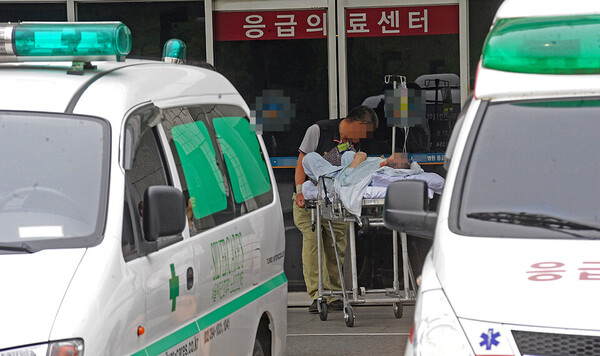The Korean Society of Emergency Medicine (KSEM) is opposing a proposal to legislate a “prioritization principle” for severe emergency patients.
The emergency medicine specialists’ group argues that the proposed revision, intended to ease chronic ER overcrowding, fails to account for the realities of emergency medicine.

On Sunday, the Korean Society of Emergency Medicine (KSEM) announced its opposition to the proposed amendments to the Emergency Medicine Act. (KBR photo)
Last Tuesday, Rep. Kim Yoon of the Democratic Party of Korea (DPK) discussed amendments to the Emergency Medicine Act and outlined the proposed changes. The amendment would delete the “capacity check” clause and introduce a “prioritization principle” for severe emergency patients.
The amendment provides a legal framework for increasing financial support to secure medical resources, restructuring the emergency care system, improving governance, reducing medical accident risks, and protecting emergency workers from assaults by intoxicated individuals.
However, KSEM criticized the bill in a statement on Sunday.
“The proposed revision of the Emergency Medicine Act, which fails to account for the realities of emergency care, will not resolve existing issues but rather exacerbate them,” it said. “It will cause great harm to the lives and health of the people with the devastating consequence of closing down emergency medical institutions.”
The association criticized Rep. Kim's proposal to establish central and regional transfer coordination centers, calling it “unjustified.” In particular, “legislating the definition of final treatment is difficult to agree with because it does not consider the reality of emergency medicine,” it said.
KSEM noted that there are already 119 emergency management centers in each city and province, the Central Emergency Medical Center and six regional emergency medical centers nationwide, which serve as control towers for coordinating the transfers of severe emergency patients.
“The mandated staffing requirement of two on-call specialists and a final care specialist is unrealistic, as even employing all emergency medicine specialists trained by KSEM would not meet the standard,” it said. “Many emergency medical centers will not be able to meet the legal standards, and (they) will be forced to abandon or delay final care rather than face penalties.”
“We (KSEM) have called for legal and institutional improvements in the field of emergency medicine, such as exemption from criminal penalties and a cap on civil damages, but these are nowhere to be seen. We strongly oppose any attempt to impose stricter burdens on emergency medical personnel and institutions, especially beyond the current law’s mandate for unconditional patient acceptance.”
“It is imperative to improve quality control in the field of emergency medical services and transport, increase the fee for consultations by emergency medical specialists and apply the same 30 percent night and holiday surcharge, regularize and institutionalize direct support for medical specialists with the increase, provide practical support for emergency medical personnel and emergency medical institutions, such as allowing the purchase of emergency medical equipment from the assessment funds, and establish and develop a regional complete emergency medical system,” KSEM said.